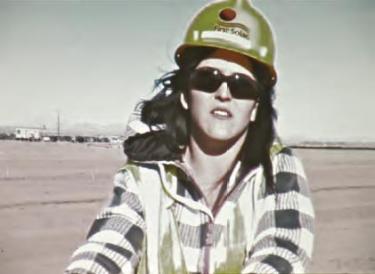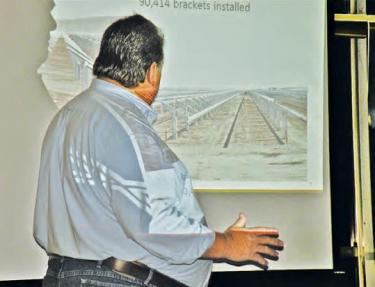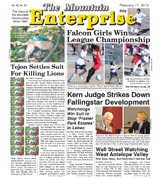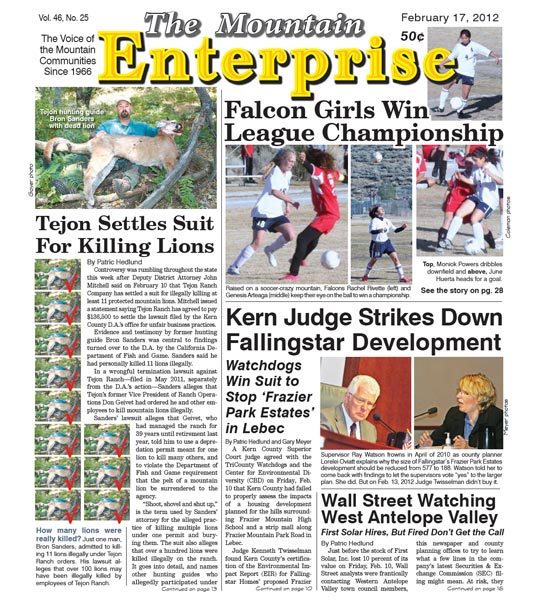![Fox Field briefing between rural town council members and the AVSR1 management team on February 7.[Hedlund photo]](https://mountainenterprise.com/fds/images/story/fs_9905.jpg)
Image 1 of 3
Fox Field briefing between rural town council members and the AVSR1 management team on February 7.[Hedlund photo]
Image 2 of 3
"iReport" by the First Solar, Inc. PR department shows people telling how much their jobs mean to them and their families.
Image 3 of 3
Construction Manager Gary Baumeister gives a construction progress power point report at the February 7 meeting. He said the posts and bracket installations were 25 percent complete. No solar panels have yet been installed.
First Solar Hires, But Fired Don’t Get the Call
By Patric Hedlund
Just before the stock of First Solar, Inc. lost 10 percent of its value on Friday, Feb. 10, Wall Street analysts were frantically contacting Western Antelope Valley rural town council members, The Mountain Enterprise and Los Angeles County planning offices to try to learn what a few lines in the company’s latest Securities & Exchange Commission (SEC) filing might mean.
At risk, they feared, was the possible loss of the sale of the company’s Antelope Valley First Solar Ranch One (AVSR1) to energy giant Exelon for $75 million if the solar facility’s Los Angeles County building permits were not fully cleared by February 24. First Solar spokespersons told analysts the 25 year contract for renewable energy to PG&E (PCG) would not be lost and that they could find another buyer, but there is also a $646 million federal loan guarantee for the project that analysts feared might be in jeopardy.
The minor panic was fueled by reports in the Wall Street Journal and the Washington Post, along with the reluctance of Los Angeles County Planning officials to be clear about the nature of the hitch in the permitting process.
First Solar produces the photovoltaic panels for the project. Under the current arrangement, it also builds and operates the facility for Exelon.
“Volatility is nothing new for First Solar (FSLR) shares, and the firm’s stock remains up over 30% so far this year,” the CNNMoney analysis wrote.
Kim Szalay of the Los Angeles County Planning Department confirmed to The Mountain Enterprise at 2 p.m. Wednesday that “the project is continuing to operate under a Conditional Use Permit. We had a temporary hold for a minor revision and that hold has been released in a ministerial judgement. The project is continuing to build.”
Speculation about what the “minor revision” was ranges from problems over the grading permit, to discord in the community over using federal funds to hire nonlocal people for construction jobs, to a landscaping plan required by the county’s “downtown planners” which desert residents find impractical and aesthetically unacceptable. They asked that it be changed.
On February 7, just days before the SEC filing was to be issued, another Fox Field airport “good neighbors” meeting was held between members of the Western Antelope Valley rural town councils and First Solar’s AVSR1 management team.
There were many assurances by the managers of their interest in meeting the concerns of the community. Two weeks later, skepticism among rural town councils and residents is returning. One ongoing issue is the “local hire” promise.
Original comments by First Solar’s Jack Piggott spoke of 250 construction jobs. Karl Humpreys of the Oso Town Council said “they now say that is closer to 74 local jobs.” On December 30 there were 37 people who were given layoff notices, without warning.
The labor contractor CLP told some of those people as recently as February 1 that there was “no action” in rehiring. Yet on February 7 AVSR1 Senior Vice President of International Construction said 31 people had been hired that week and 12 more would be brought on the following week.
First Solar spokesperson Alex Martin said, “Since the beginning of the year, we’ve rehired 7 of the furloughed personnel, hired another 12 on Monday, Feb. 6, and 12 on Thursday, Feb. 9; this breakdown makes up the 31 people. We’ll continue to keep track of the number of local hires and will update the community on these figures at the next monthly meeting.”
Meanwhile, in last week’s report we mentioned increasing tension over objections to wind turbines in the region.
Jeff Olesh was accused by the Fairmont Town Council president of making threats to influence a vote on the subject. Olesh denies that. He said that he has expressed concern about promises being made by companies to influence town councils and that “renewable energy coming to the Antelope Valley is like the goldrush.”
Olesh said his driving concern is “about having rare plants and animals for our grandchildren.”
This is part of the February 17, 2012 online edition of The Mountain Enterprise.
Have an opinion on this matter? We'd like to hear from you.


